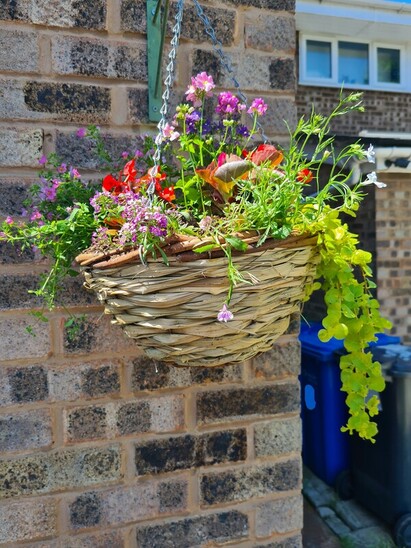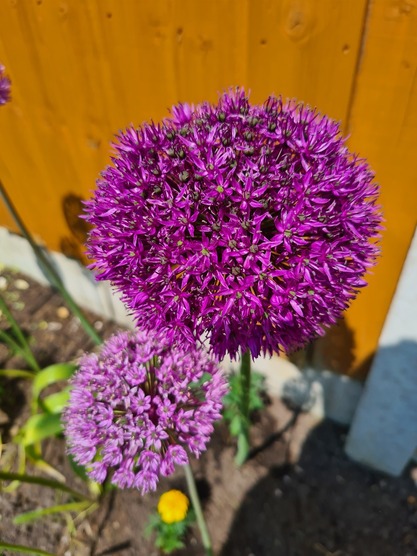|
I've been sorting out my garden over the last few weeks, so here's a post on gardening for mental health. I've always been a keen gardener, learning from my mum about plants and then growing my own when I moved out of home. Over the years, it's been something that I've managed to keep doing throughout house moves and general life stress, and it's something that I genuinely enjoy (apart from when the slugs eat all my dahlias or there aren't enough ladybirds to keep on top of the aphid population!) You might not know this even if you're in the UK, but gardening is something that the NHS has been prescribing for people (via social prescribing initiatives) since 2019. There's a significant body of research suggesting that being out in green spaces is supportive of health and wellbeing, and that includes mental health and wellbeing too! Making space One of the benefits of gardening is that it gives you time out from the daily grind. There's no real way to "hurry up" the process of planting, tending to and growing plants, so you have to be patient and make space in your life for seeds to turn into seedlings, and for those seedlings to turn into beautiful plants. It encourages you to slow down and savour the moment - and these days, that is an important skill to cultivate. Dealing with disappointment Aside from the previously mentioned slugs and aphids, there are a million ways that gardening can go slightly wrong - if the weather is too wet, dry, or simply too much at the wrong time, if the ecosystem in your garden isn't balanced so that you end up with too many of one insect and not enough predators/prey, if you go away for a long weekend and we end up with a surprise heatwave - all these things and more can lead to your plants withering and sometimes dying before you've even realised that there's a problem. Gardening helps you to realise that there are often disappointments in life, but that you have the skills to cope with them - plant more seeds, keep on top of the weeding, or try again next year. Better days are coming. Engage your senses
Gardening is a naturally mindful activity - as we've said, it encourages you to slow down and notice what's happening around you. But it also encourages you to engage all of your senses in doing so, which allows you to fully immerse yourself in the experience. Do you know what an apple tree smells like when it's in blossom? Have you ever stopped to watch a bee collecting pollen from a flower? Can you tell the difference between a magpie call and a starling call? Spend a bit of time in your garden, and you soon will. Accessible to all Not everyone has access to a garden, or to any green space that they can call their own (my last house had an entirely paved back garden where nothing would dare to grow unless it was in a pot), but most everyone has access to a windowsill, a small pot of dirt where you can put some marigolds, a friend who can get you £1 daffodils from the supermarket in Spring. You don't have to have a huge garden - you don't even really have to get outside, although if you can it'll be better for you - but anyone can grow something, from houseplants to basil for sprinkling on your pasta. Gardening is a really accessible hobby. My favourites Everyone has a favourite plant - if you're looking for some interesting things to grow in order to set off your passion for gardening, here are the plants I enjoy watching grow in my garden:
Do you like gardening, or do you want to learn? Let me know in the comments!
0 Comments
Leave a Reply. |
AuthorDr Sarah Blackshaw: Clinical Psychologist, blogger, tea drinker, interested in dinosaurs and shiny objects Archives
January 2024
Categories
All
|
Photos from wuestenigel (CC BY 2.0), Ivan Radic (CC BY 2.0), Marco Verch (CC BY 2.0), John Brighenti, wuestenigel, simplicityhunter, Anarchimedia, Find Rehab Centers, wuestenigel, Ivan Radic, Army Medicine, kennethkonica, smallcurio, Jasmic, wuestenigel, JoanDragonfly, BrightStarPhoto21, popofatticus, wuestenigel, forthwithlife, kurotango Clip, ⍘dotism⍘, Tambako the Jaguar, One Click Group UK, Rawpixel Ltd, Blue Mountains Library, wuestenigel, mattbuck4950, h.koppdelaney, verchmarco, The Mom With a Camera, cloudplanner, wuestenigel, verchmarco, OIST (Okinawa Institute of Science and Technology), stevendepolo, juliejordanscott


 RSS Feed
RSS Feed